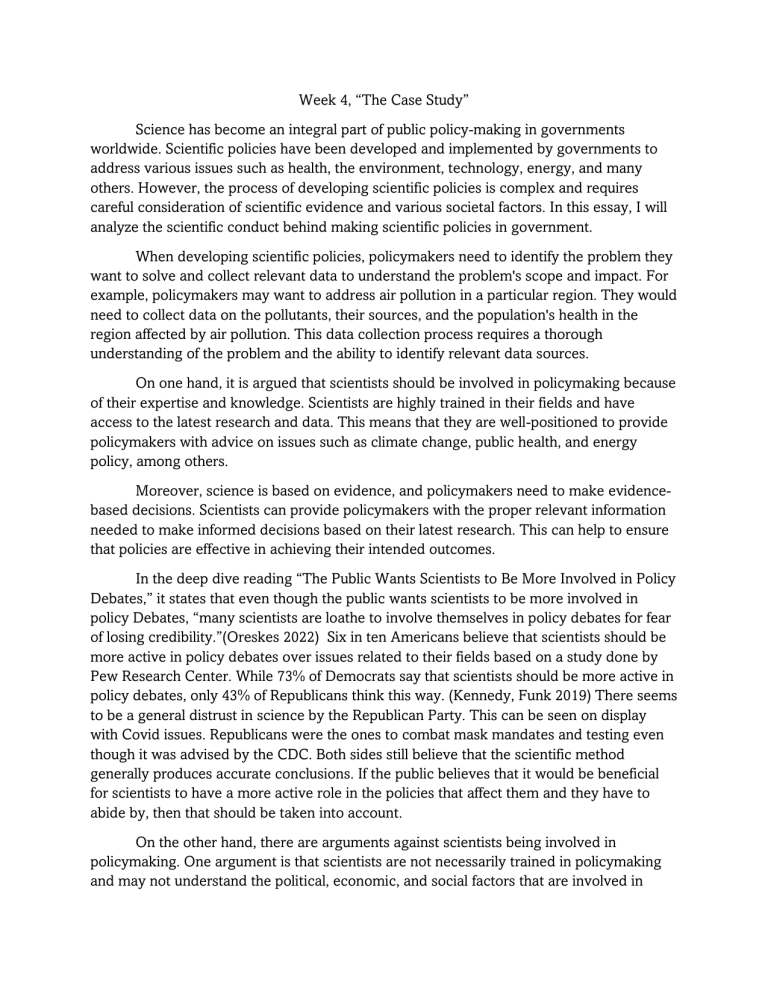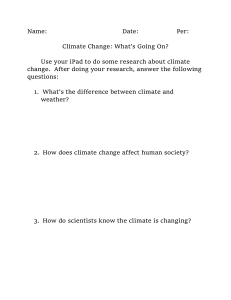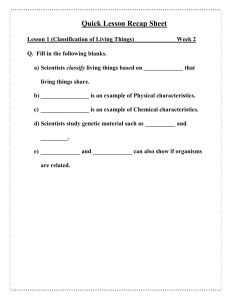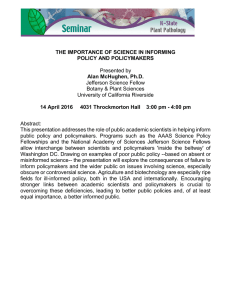
Week 4, “The Case Study” Science has become an integral part of public policy-making in governments worldwide. Scientific policies have been developed and implemented by governments to address various issues such as health, the environment, technology, energy, and many others. However, the process of developing scientific policies is complex and requires careful consideration of scientific evidence and various societal factors. In this essay, I will analyze the scientific conduct behind making scientific policies in government. When developing scientific policies, policymakers need to identify the problem they want to solve and collect relevant data to understand the problem's scope and impact. For example, policymakers may want to address air pollution in a particular region. They would need to collect data on the pollutants, their sources, and the population's health in the region affected by air pollution. This data collection process requires a thorough understanding of the problem and the ability to identify relevant data sources. On one hand, it is argued that scientists should be involved in policymaking because of their expertise and knowledge. Scientists are highly trained in their fields and have access to the latest research and data. This means that they are well-positioned to provide policymakers with advice on issues such as climate change, public health, and energy policy, among others. Moreover, science is based on evidence, and policymakers need to make evidencebased decisions. Scientists can provide policymakers with the proper relevant information needed to make informed decisions based on their latest research. This can help to ensure that policies are effective in achieving their intended outcomes. In the deep dive reading “The Public Wants Scientists to Be More Involved in Policy Debates,” it states that even though the public wants scientists to be more involved in policy Debates, “many scientists are loathe to involve themselves in policy debates for fear of losing credibility.”(Oreskes 2022) Six in ten Americans believe that scientists should be more active in policy debates over issues related to their fields based on a study done by Pew Research Center. While 73% of Democrats say that scientists should be more active in policy debates, only 43% of Republicans think this way. (Kennedy, Funk 2019) There seems to be a general distrust in science by the Republican Party. This can be seen on display with Covid issues. Republicans were the ones to combat mask mandates and testing even though it was advised by the CDC. Both sides still believe that the scientific method generally produces accurate conclusions. If the public believes that it would be beneficial for scientists to have a more active role in the policies that affect them and they have to abide by, then that should be taken into account. On the other hand, there are arguments against scientists being involved in policymaking. One argument is that scientists are not necessarily trained in policymaking and may not understand the political, economic, and social factors that are involved in making policy decisions. This means that scientists may not be able to provide policymakers with advice that is practical or feasible. Furthermore, scientists may not have a good understanding of the broader societal impacts of the policies they are recommending. For example, a policy that is effective in achieving its intended outcome may have unintended consequences that are harmful to certain groups of people. Scientists may not have a good understanding of these broader impacts, and policymakers need to take these impacts into account when making policy decisions. Policymakers may have biases or personal opinions that influence their decisions on the laws and policies they make. Policymakers are not immune to the same biases that affect everyone else, and their biases can affect their recommendations for the policies being made. For example, a representative from Iowa has an obligation to do what is right for their constituents in Iowa and may neglect the broader community as a whole. Given that scientists have a broader perspective on the issues they research, allowing them to have a more active role in policymaking can be very beneficial. Leaving it strictly up to policymakers can lead to policies that are not evidence-based or that are not effective in achieving their intended outcomes. In my opinion, scientists should play a role in policymaking, but they should not be the ones making policy decisions. Scientists can provide policymakers with the evidence they need to make informed decisions, but policymakers are the ones who need to balance scientific evidence with other factors such as political, economic, and social considerations. If scientists are going to take a more active role in policy debate they must remain committed to proper scientific conduct. This means being transparent about their research findings and limitations, avoiding biased or exaggerated claims, and engaging in constructive dialogue with policymakers. By doing so, scientists can ensure that their expertise is used to inform evidence-based policies that benefit society as a whole. The language of scientists and policymakers differ which often creates a disconnect between the two groups. Scientific articles and data are often seen as hard to understand and comprehend due to the use of Greek letters, mathematical symbols, and scientific terms. (Choi, Pang, Lin, Puska, Sherman, Goddard, Ackland 2005, 633)While it’s a general practice for scientists to publish their results and have their papers reviewed, policymakers don’t do much to publish their findings and designate a lot of them confidential. These scenarios create an even bigger divide between them. Scientists will never have full control of policies related to their fields, so the only way to move forward is to figure out how to bridge this gap. One solution is to improve scientific communication. Scientists can make an effort to communicate their research findings in simple language that policymakers and the public that aren’t very knowledgeable in the specific field can understand. Policymakers can also provide feedback to scientists on the usefulness of the information and how it can be better communicated. This can help to improve the effectiveness of scientific evidence in policy decision-making. Another solution is to encourage collaboration between scientists and policymakers. This can be achieved by creating platforms for dialogue and interaction between the two groups. For example, policymakers can involve scientists in the policymaking process by consulting them on relevant issues and providing opportunities for them to share their expertise. This can help to ensure that policy decisions are informed by the latest scientific evidence. In conclusion, while scientists have an important role to play in policymaking, they should not be the ones making policy decisions. Policymakers are responsible for balancing scientific evidence with other factors such as political, economic, and social considerations, and they need to take into account the broader societal impacts of the policies they are recommending. There needs to be more communication and willingness to trust the scientists that are involved in these discussions. By working together, scientists and policymakers can ensure that policies are evidence-based, effective, and reflective of the public's values and priorities. Work Cited: Choi, Bernard C. K., Tikki Pang, Vivian Lin, Pekka Puska, Gregory Sherman, Michael Goddard, Michael J. Ackland, et al. 2005. “Can Scientists and Policy Makers Work Together?” Journal of Epidemiology & Community Health 59 (8): 632–37. https://doi.org/10.1136/jech.2004.031765. Kennedy, Brian, and Cary Funk. 2019. “Democrats and Republicans Differ over Role and Value of Scientists in Policy Debates.” Pew Research Center. Pew Research Center. August 9, 2019. https://www.pewresearch.org/fact-tank/2019/08/09/democratsand-republicans-role-scientists-policy-debates/. Oreskes, Naomi. 2022. “The Public Wants Scientists to Be More Involved in Policy Debates.” Scientific American, September. https://doi.org/10.1038/scientificamerican0922-78.




